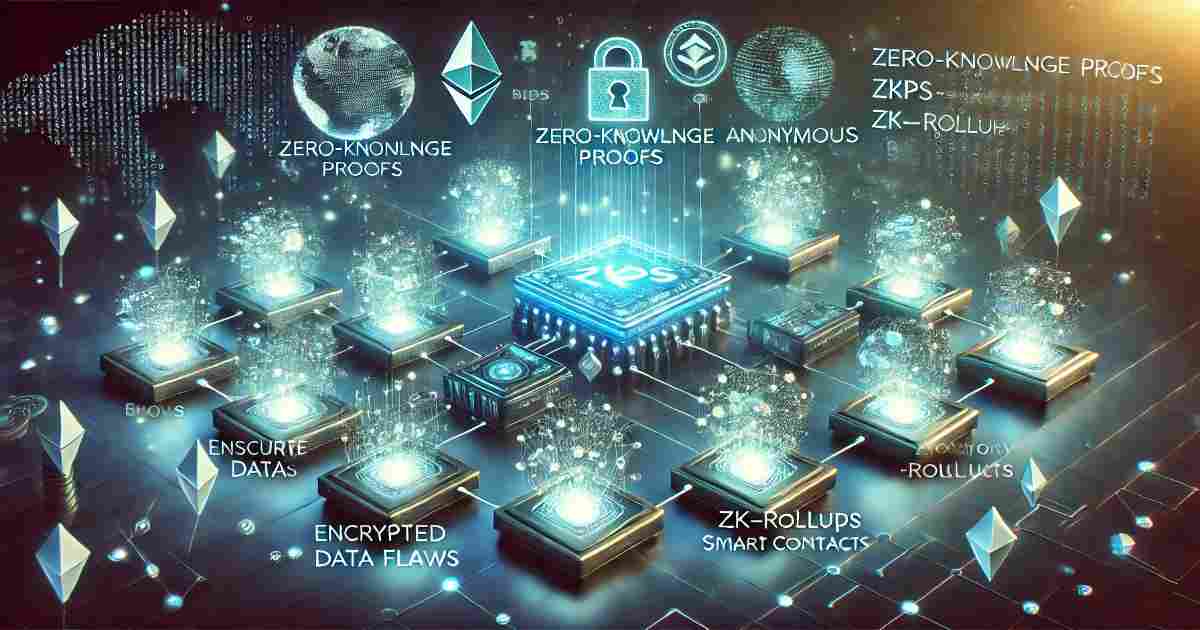Zero-Knowledge Proofs (ZKPs) have emerged as a groundbreaking cryptographic method, playing a crucial role in enhancing privacy and security within blockchain technology. At their core, ZKPs allow one party (the prover) to demonstrate to another party (the verifier) that a specific statement is true, without revealing any additional information beyond the validity of the statement itself.
How ZKPs Work
ZKPs operate on three fundamental principles:
- Completeness: If the prover’s statement is true, the verifier will be convinced of its truth.
- Soundness: If the prover’s statement is false, the verifier will not be misled into believing it is true.
- Zero-Knowledge: No information about the statement itself, apart from its truth, is disclosed to the verifier.
To achieve these principles, ZKPs use advanced mathematical techniques such as cryptographic hashes, elliptic curve cryptography, and polynomial commitments.
Applications of ZKPs in Blockchain
ZKPs have transformed blockchain by addressing two critical challenges: privacy and scalability.
1. Privacy
- Anonymous Transactions: ZKPs enable blockchain systems to validate transactions without revealing sensitive details, such as the identities of the sender and receiver or the transaction amount.
- Example: Zcash, a privacy-focused cryptocurrency, uses zk-SNARKs (Zero-Knowledge Succinct Non-Interactive Arguments of Knowledge) to ensure private and secure transactions.
- Confidential Contracts: ZKPs allow smart contracts to execute terms without exposing the underlying data, crucial for industries like healthcare and finance.
2. Scalability
- Off-Chain Computation: ZKPs facilitate layer-2 solutions like zk-rollups, which batch transactions off-chain and submit a single proof to the main blockchain, significantly reducing computational load and gas fees.
- Example: Ethereum utilizes zk-rollups to enhance transaction throughput while maintaining security.
3. Compliance Without Compromise
- Regulatory Compliance: ZKPs enable entities to prove compliance with regulations (e.g., proving sufficient reserves for stablecoins) without exposing sensitive data.
Advantages of ZKPs in Blockchain
- Enhanced Privacy: Protects user and transaction details.
- Improved Scalability: Reduces on-chain data, improving efficiency.
- Decentralized Trust: Maintains blockchain’s trustless nature.
- Regulatory Adoption: Balances privacy with transparency for legal compliance.
Challenges and Limitations
While ZKPs hold immense potential, they are not without challenges:
- Complexity: Implementing ZKPs requires advanced cryptographic expertise.
- Computational Overhead: Generating and verifying proofs can be resource-intensive.
- Standardization: The technology is still evolving, with a need for standardized protocols.
Future Prospects Of Zero-Knowledge Proofs (ZKPs) in blockchain
As blockchain technology evolves, ZKPs are expected to play an increasingly pivotal role in:
- Interoperability: Facilitating seamless and secure communication between different blockchains.
- DeFi and Web3: Enhancing privacy and scalability for decentralized applications.
- Enterprise Blockchain: Enabling confidential business processes and data sharing.
Zero-Knowledge Proofs represent a paradigm shift in blockchain, bridging the gap between privacy, security, and scalability. By enabling trustless and private verification, ZKPs are poised to revolutionize blockchain applications across industries, paving the way for a more secure and efficient digital future.
